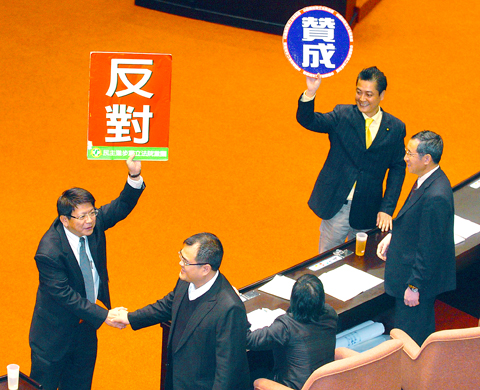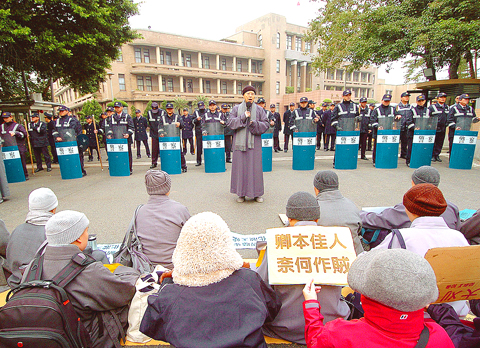Despite demonstrations outside the legislature, the Legislative Yuan yesterday approved an amendment to the Offshore Islands Development Act (離島建設條例), legalizing the operation of casinos on the nation’s outlying islands.
The 98 legislators present during the plenary session voted 72 to 26 in support of a proposed amendment by the Non-Partisan Solidarity Union (NPSU) that would allow the opening of casinos on islands like Kinmen, Matsu, Orchid Island and Green Island.
Gambling is illegal in Taiwan.

PHOTO: LIAO CHEN-HUEI, TAIPEI TIMES
The amendment stipulated that local governments must hold a referendum before building casinos.
The referendums would only need to win support from more than half of the voters participating in the referendum.
The bill stipulated that casinos be located within international resorts that include an international hotel, tourism facilities, international conference halls and shopping malls.

PHOTO: FANG PIN-CHAO, TAIPEI TIMES
Companies interested in building an international resort on any of the nation’s islands would need to apply to the Ministry of Transportation and Communications.
The legislature also approved another amendment to the act that would oblige the central government to set up a minimum fund of NT$30 billion (US$901 million) to improve the development of the islands.
After passage of the amendments, Chinese Nationalist Party (KMT) and NPSU legislators applauded the move, while Democratic Progressive Party legislators chanted: “Gambling cannot save the nation’s economy.”
NPSU Legislator Lin Pin-kun (林炳坤) told reporters that legalizing operation of casinos on the islands was necessary for the country to be “internationalized.”
KMT Legislator Wu Ching-chih (吳清池) said he cast an affirmative vote as a result of the caucus’ decision, but that he “was saddened” to see the bill pass.
DPP Spokesman Cheng Wen-tsang (鄭文燦) said the DPP regretted the passing of the bill and that the KMT should take responsibility for the consequences of opening casinos in the country.
Outside the legislature, a group of Buddhist monks and other activists demonstrated against the passage of the amendments.
“We are disappointed and upset about this result. Such a controversial issue should have been openly debated and decided by a nationwide referendum,” Buddhist master Shih Chao-hui (釋昭慧) told demonstrators. “Representatives for the Catholic and Protestant churches, as well as Buddhists in Taiwan, have stood up against casinos today. The KMT has apparently taken a hostile step against religious organizations in Taiwan.”
Aside from Shih, Archbishop of Taipei John Hung (洪山川) and a preacher from the Taiwan Presbyterian Church, Lu Chun-yi (盧俊義), also joined the protest. The protesters recited a sutra — usually recited at funerals to redeem the deceased from his or her sins — to wash away the sins that KMT lawmakers committed by passing the amendment, Shih said.
The religious groups were joined by other civic groups who wished to express their concern about the negative impact of casinos.
“The crime rate in Las Vegas went up 1.7 times after gambling was legalized,” Citizen Congress Watch executive director Ho Tsung-hsun (何宗勳) said. “Las Vegas is also the city with the highest suicide and divorce rates in the US.”
Green Party Taiwan Secretary-General Pan Han-shen (潘翰聲) said that casinos could become money-laundering centers. Hu Tzu-fei (胡姿妃), a junior at National Penghu University, said that building casinos was an appropriate development strategy for Penghu.
Penghu County is so far the most probable candidate for the country’s first casino resort.
“What benefits will casinos bring for Penghu residents?” Hu asked. “The water and electricity supply systems are incapable of supporting large-scale casino resorts."
“We don’t have a big enough airport, flights are often sold out, and the weather in Penghu is not all that good,” she said.
Instead, Hu said the islands should promote the tourism resources it already has, including its landscape, beaches and unique cultural sites.
She added that the windy climate and surrounding waters make Penghu an ideal place to for sailing.
“Why can’t we develop tourism without casinos?” she said.
Presidential Office Spokesman Wang Yu-chi (王郁琦) said yesterday that the establishment of casinos on outlying islands was one of President Ma Ying-jeou’s (馬英九) campaign promises.
Outlying islands have limited resources and face financial problems, Wang said.
Wang said that Ma’s support for the amendments was to back the removal of legal roadblocks, not an endorsement for casinos on Taiwan proper, at least not at the moment.
Whether outlying islands establish casinos is up to local governments to decide, Wang said.
Meanwhile, Cabinet Spokesman Su Jun-pin (蘇俊賓) said yesterday that the government would take into consideration the concerns of the opponents of the “casino clause” when it maps out plans to establish tourism zones with casinos in offshore islands in the future.
“The passage [of the casino clause] was merely a step to decriminalize gambling in outlying islands, which did not mean that the government is set to establish casino there,” Su said.
Su said that casinos on outlying islands would only be established alongside appropriate supportive measures to make sure the development did not disrupt public security, damage the interests of local residents as well as to local ecology and environment.
Penghu County Commissioner Wang Chien-fa (王乾發) said yesterday that the county was scheduled to hold a referendum in either April or May. Until then, the county government would inform and communicate with Penghu residents about any development ideas
Wang said the amendment only decriminalized gaming, meaning that gambling would not face criminal charges from legal authorities. However, the government must still stipulate rules to regulate casino owners.
The government must also ensure that bids for operational licenses are conducted in a transparent manner. All this preparatory work will take at least a year to finish, he said.
The passage of the amendment was seen as encouraging for international investors like Amazing Holdings, which has been working on the development for about eight years.
Company executive Michael Treanor said yesterday that the company was pleased the bill was finally passed.
Treanor said that his company’s development plan had passed an environmental impact review and secured construction permits for a five-star resort hotel. The amendment came at a good time, he said.
The global economic downturn notwithstanding, Treanor said that the gambling industry was “recession-resistant” and that market studies showed their projects were still viable. The company was confident it would be able to win the support of Penghu residents, Treanor said.
Meanwhile, Citizen Congress Watch executive director Ho Tsung-hsun (何宗勳) urged the Cabinet to ask the legislature reconsider the amendment, saying that if not the organization would stage a large parade before May 20 in protest against the bill.
ADDITIONAL REPORTING BY SHIH HSIU-CHUAN, KO SHU-LING, RICH CHANG AND CNA

Right-wing political scientist Laura Fernandez on Sunday won Costa Rica’s presidential election by a landslide, after promising to crack down on rising violence linked to the cocaine trade. Fernandez’s nearest rival, economist Alvaro Ramos, conceded defeat as results showed the ruling party far exceeding the threshold of 40 percent needed to avoid a runoff. With 94 percent of polling stations counted, the political heir of outgoing Costa Rican President Rodrigo Chaves had captured 48.3 percent of the vote compared with Ramos’ 33.4 percent, the Supreme Electoral Tribunal said. As soon as the first results were announced, members of Fernandez’s Sovereign People’s Party

MORE RESPONSIBILITY: Draftees would be expected to fight alongside professional soldiers, likely requiring the transformation of some training brigades into combat units The armed forces are to start incorporating new conscripts into combined arms brigades this year to enhance combat readiness, the Executive Yuan’s latest policy report said. The new policy would affect Taiwanese men entering the military for their compulsory service, which was extended to one year under reforms by then-president Tsai Ing-wen (蔡英文) in 2022. The conscripts would be trained to operate machine guns, uncrewed aerial vehicles, anti-tank guided missile launchers and Stinger air defense systems, the report said, adding that the basic training would be lengthened to eight weeks. After basic training, conscripts would be sorted into infantry battalions that would take

GROWING AMBITIONS: The scale and tempo of the operations show that the Strait has become the core theater for China to expand its security interests, the report said Chinese military aircraft incursions around Taiwan have surged nearly 15-fold over the past five years, according to a report released yesterday by the Democratic Progressive Party’s (DPP) Department of China Affairs. Sorties in the Taiwan Strait were previously irregular, totaling 380 in 2020, but have since evolved into routine operations, the report showed. “This demonstrates that the Taiwan Strait has become both the starting point and testing ground for Beijing’s expansionist ambitions,” it said. Driven by military expansionism, China is systematically pursuing actions aimed at altering the regional “status quo,” the department said, adding that Taiwan represents the most critical link in China’s

EMERGING FIELDS: The Chinese president said that the two countries would explore cooperation in green technology, the digital economy and artificial intelligence Chinese President Xi Jinping (習近平) yesterday called for an “equal and orderly multipolar world” in the face of “unilateral bullying,” in an apparent jab at the US. Xi was speaking during talks in Beijing with Uruguayan President Yamandu Orsi, the first South American leader to visit China since US special forces captured then-Venezuelan president Nicolas Maduro last month — an operation that Beijing condemned as a violation of sovereignty. Orsi follows a slew of leaders to have visited China seeking to boost ties with the world’s second-largest economy to hedge against US President Donald Trump’s increasingly unpredictable administration. “The international situation is fraught